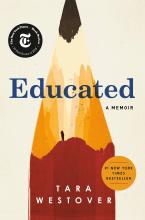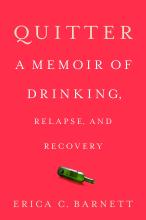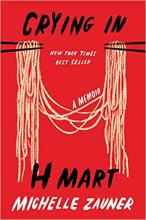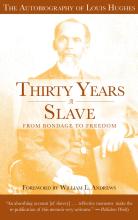Memoir is a genre that takes life on a literary journey. Memoir’s transformation of life into literature doubles a common theme most memoirs engage: the transformation and often transcendence of the individual. Memoirs primarily focus on developing themes through a limited selection of real-life stories about their authors. This is what primarily differentiates memoir from autobiography, a more “life as history” oriented subgenre that tends to trace a life from beginning to end (the end being of course the writing of the autobiography).
Books featured in this article are all memoirs recommended by English Matters editor Henry Laufenberg. I fell under memoir’s spell around when COVID hit, and have spent much of my quiet time since reading what other people make of themselves and the world. Below are four memoirs well-worthy of one’s time and attention. Happy reading!

Educated: A Memoir plays in your mind long after you’ve finished reading. Author Tara Westover harrowingly recounts her abusive upbringing essentially captive to isolated fundamentalist survivalist parents in rural Idaho. Young Tara is thoroughly infused with her parents’ distorted and extreme world views. Educated describes her gradual awakening as she advances through the processes of education and educational attainment. As she slowly grows out of a miserable, confining world, Westover catalogues constant psychic struggle on multiple-levels–internally, with familial and outside relationships, with institutions, with god. Over the course of decades, Westover finally arrives at a stable understanding of the world and who she might continue to become in it. Educated: A Memoir is a powerful story very well told, both deeply frustrating and undeniably inspirational, that deserves the many awards critics showered upon it soon after publication.

Erica C. Barnett is a high-priest of moving eyes across pages. Quitter: A Memoir of Drinking, Relapse and Recovery is characteristically chock-a-block with Barnett’s bold, snappy, cranky prose, a “house-style” doubtlessly tailored from years of churning simultaneously engaging and serious critical content for for-profit news and public affairs media. Like many recovery narratives, Quitter is honest, messy, and at times unseemly, but also offers plenty of analytic content, sparing the reader an exercise in pure voyeurism. Unlike most recovery narratives though, Barnett’s recovery—predictably given her baseline iconoclasm—doesn’t follow the typical blueprint. Rather, Barnett traces her own path in considered contrast to some conventional recovery praxis. And beyond Barnett’s story of addiction, recovery, repeat, in its minor key, Quitter is a delightfully juicy tell-all, focused on the pantheon of Seattle alt-media luminaries of the early 2000’s. This time was arguably the golden age of alternative media in our progressive burg Seattle, as the internet superseded paper media and many more voices occupied the local news space. Behind a penetrable courtesy veil of nearly on-the-nose pseudonyms, Barnett’s lens unabashedly elevates or throws under buses as it sees fit, giving journalists we’ve read avidly for years dimensions they might or might not appreciate. Juicy content, but not without value—Barnett’s project here ruminates thematically on how a brash, defensive pessimist can be honest with, and about, herself and others. No scabs are left unpicked; sunlight and fresh air ultimately have healing effects.

Korean born Michelle Zauner grew up in Eugene Oregon. As a youngster, like most youngsters, she wanted desperately to fit in, or at least not stick out, and so eschewed and minimized her Korean heritage as she pursued inclusion in Eugene’s robust, and nearly entirely white, indie rock scene. Her Korean mother’s protracted battle with cancer and eventual death left Zauner devasted. Crying in H-Mart is Zauner’s story of existential crisis, wherein recovery of her lost Korean identity is central to healing the loss of her beloved mom. This recovery informs the evolution of Zauner’s successful band, Japanese Breakfast, in pushing out of the ethnic genericism that tends to characterize the otherwise generally progressive indie rock genre. A deep and touching memoir, Crying in H-Mart has been optioned for a major motion picture. If the screen adaptation is done well, there is certainly potential for Academy Awards. But do read the book first – one after all never seems to regret reading before streaming!

Given its recent popular exposure and success, most of us are now familiar with Solomon Northrup’s Twelve Years a Slave. Fewer though have read Louis Hughes’ Thirty Years a Slave. This should change. A masterful communicator, Hughes recounts the horrors and daily mundanities of 30 years of slavery he was born into. Thirty Years a Slave, as such, constitutes a valuable historical document, a great choice for history curricula. But this is Hughes’ memoir, and so is also regularly interspersed with an almost off-hand pathos. Hughes’ unflinching documentary is happening to him, a human being as a small child literally torn by strangers from his mother, subjected to the full range of the inhuman horrors of chattel slavery. This fact gently but with repeated persistence asserts itself to the reader, creating a compounding cycle of historical interest ruptured by empathetic outrage. It’s a narrative one may need to put down here and again (a luxury not afforded to its author) that compels to be picked back up. Note that Louis Hughes’ Thirty Years A Slave: From Bondage to Freedom is in the public domain, and so available in various formats through a quick search of the internet.